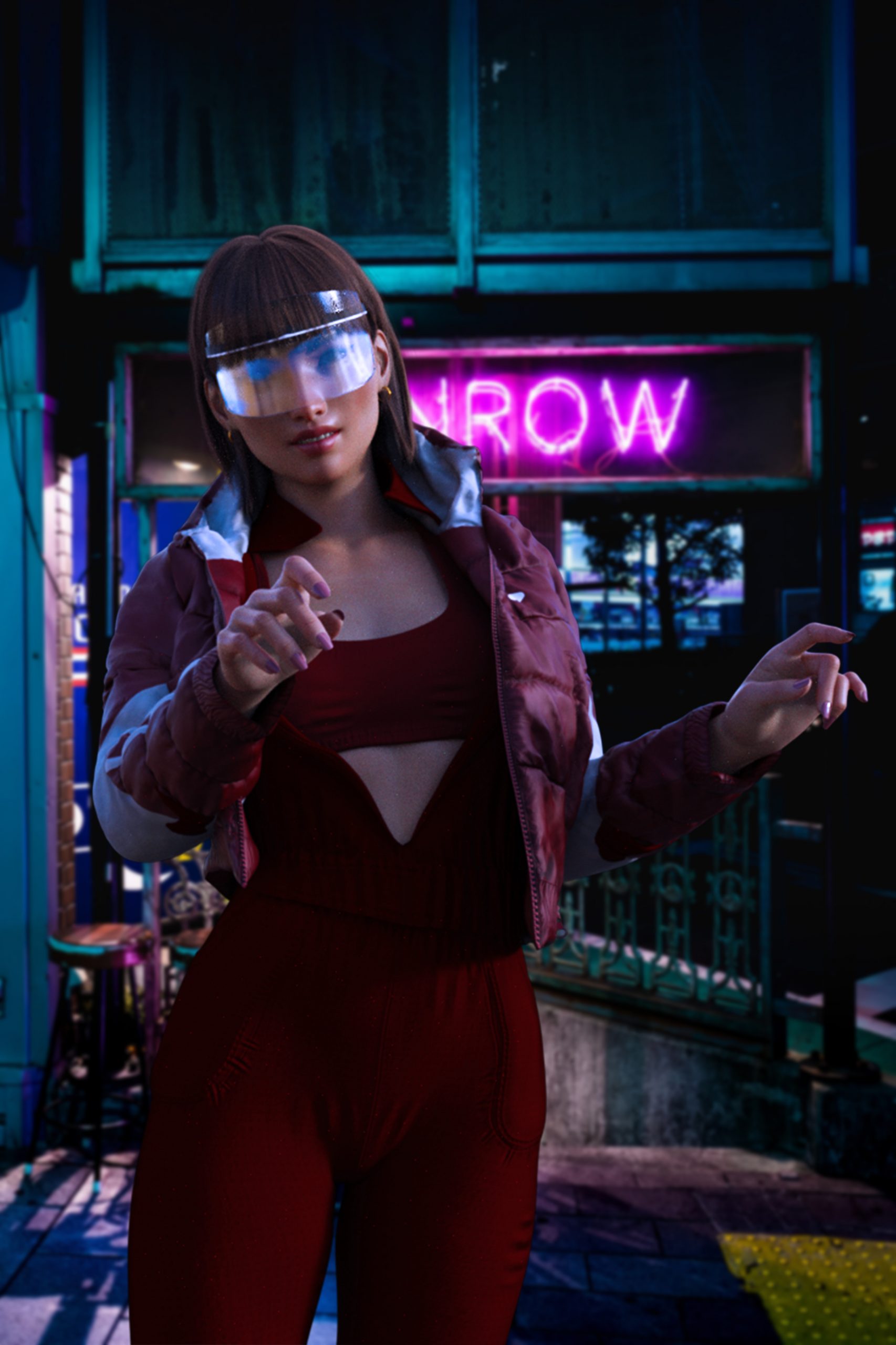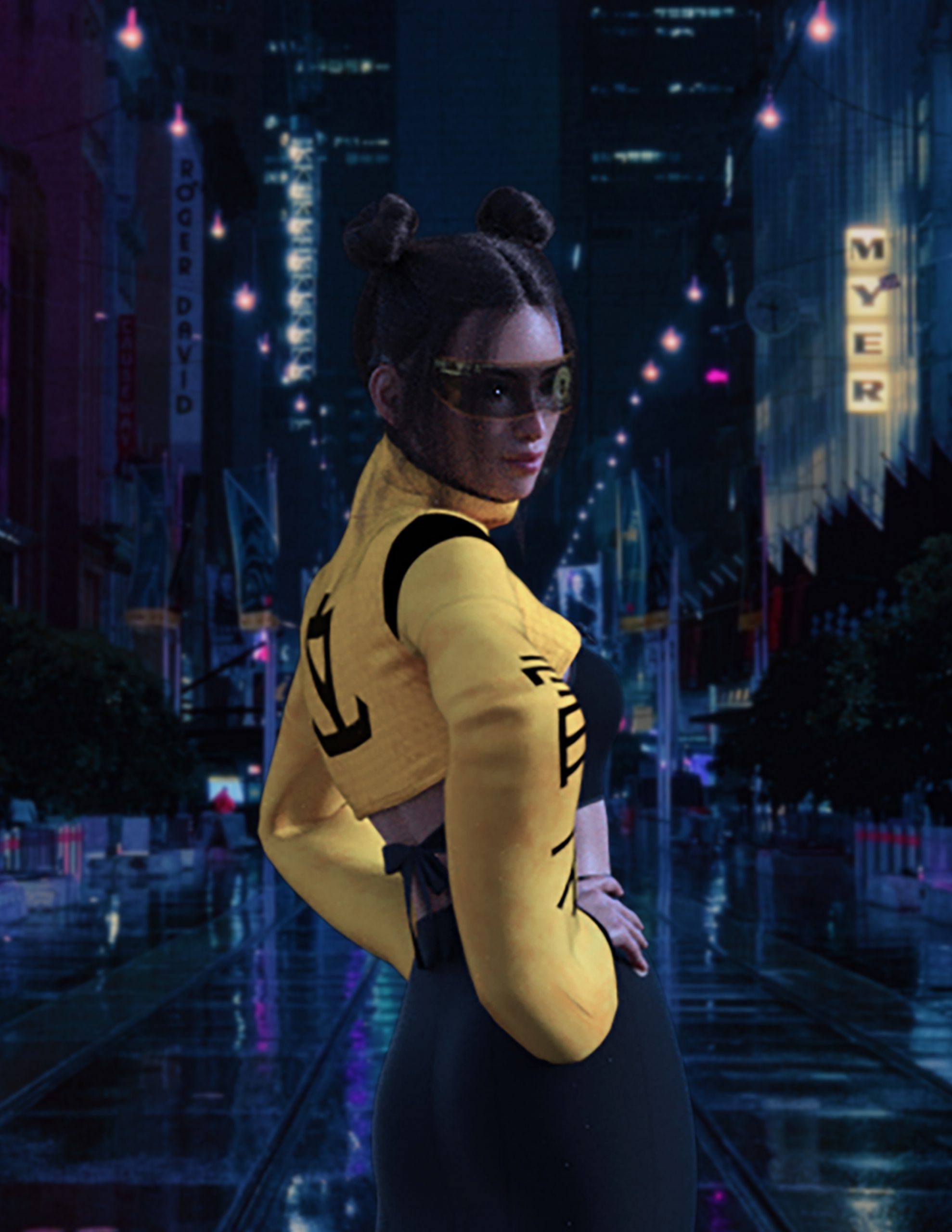Ava Gram‘s outfits are reminiscent of the early 2000s. She poses for the camera, either against a backdrop of everyday Singaporean greenery and sheltered walkways, or neon-lit streets that look straight out of Blade Runner or Akira. Recently, she even collaborated with department store BHG in Singapore, taking over its Instagram feed and modeling the store’s new pieces.
She might sound like any young, Instagram-obsessed girl, but Ava is not your typical influencer.
As a self-described “virtual girl” and “digital connoisseur,” she joins the likes of Lil Miquela, who has 2.8 million Instagram followers. Virtual influencers are computer-generated characters who have, in recent years, gained popularity. Lil Miquela has inked deals with major brands like Prada and conducted interviews at Coachella. Brands have even started to create their own virtual ambassadors, like Puma’s Maya, a “Southeast Asian virtual girl.”
Every virtual influencer is backed by a team, which curates their social media feeds, appearance, personality, and even their likes and dislikes.
Ava is racially ambiguous, gender-fluid, appreciates social causes, and is not afraid to say what’s on her mind, her creator Reyme Husaini told KrASIA.
Husaini, a recent graduate from Singapore’s Lasalle College of the Arts, is the brains behind Ava, although he occasionally ropes in a friend to help with the captions for Ava’s social media posts. Ava was Husaini’s final year project, a culmination of his desire to create a fashion avatar who is not just an influencer, but also a platform for championing social and political beliefs. For instance, Ava’s Instagram feed features posts of her at Pink Dot, an annual event that fosters support for the LGBTQ community in Singapore.
KrASIA spoke with Ava, Singapore’s first virtual fashion influencer, to learn more about what makes her tick.

KrASIA (KR): Can you introduce yourself?
Ava Gram (AG): For those who don’t me, I just want to say, “Nice to meet y’all for the first time!” Who am I? I’m Ava, your next-door, Y2K, cyber-loving, digital girl.
KR: What social issues do you advocate for?
AG: A social issue that I’m very vocal about is racial inequality. It’s a very distinctive issue that we face nowadays. Racism is still very much alive and well in this country. It might be casual banter between your close friends, or maybe something as simple as applying for a job interview. If it’s happening around you, don’t be afraid to call that person out for it. I believe that change starts with you.
KR: Can you explain what the terms “woke” and “gender-fluid” mean, for those who aren’t aware?
AG: It’s a very millennial or Gen Z thing to say. Being “woke” is all about the awareness of the social and political climate today, such as racial injustice, gender wage gap, and discrimination of the LGBTQ community. These are some issues that I’m passionate about. Being gender-fluid is someone who does not see themselves as masculine or feminine.
Yes, I may be perceived as a female human, but to me, gender is more than that. I’m a virtual being. A digital entity. A simulation. I’m neither a female nor a male. Therefore, I am gender-fluid.
Read this: [Tuning in] Christopher Travers, founder of VirtualHumans.org, says virtual influencers are gaining popularity
KR: You’ve recently worked with BHG as an influencer. How was the experience?
AG: It was an amazing and positive experience. It was my first Instagram takeover for a well-respected brand. I personally thought it was bold and forward-thinking for them to engage with a virtual avatar. Not many brands in Singapore have collaborated with us virtual influencers. Not only was I able to showcase my platform to more people, but I also had the opportunity to share my daily experiences with them while wearing clothes designed by Esther Choy, an alumni from LaSalle College of the Arts.
KR: What would you tell brands that want to work with you?
AG: Just holler at your girl here! I’m open to working with any brands at the moment who are not afraid to be forward-thinking and don’t mind my political or social views.
KR: I notice that you hang out with Reyme quite a bit. Could you tell me about your relationship with him?
AG: He’s such a vibe! 😉
KR: As a fashion influencer, where do you shop?
AG: I wear what I like! Currently, I’m really into the early 2000s Y2K vibes. So what is this Y2K fashion that I’m obsessing about? Y2K is an internet aesthetic that was prevalent from roughly 1995 to 2003. Named after the Y2K bug, it is characterized by a distinctive digital aesthetic period that encapsulates fashion, hardware design, music, and furnishings with technological optimism from that particular time.
KR: What are some common misconceptions about being an influencer?
AG: When I look at an influencer’s Instagram page, I often wonder, “What are they actually influencing?” The term “influencer” has become very trivial. To me, being an influencer is not about having thousands of followers, but the ability to influence a substantial idea, belief, or value in someone, even if it’s just one person! It is definitely more than just product promotions and paid advertisements.
KR: Are you human?
AG: Almost.

KR: Do you have a voice? What do you sound like?
AG: Yes, I do have a voice, and it is used as a platform to advocate for issues that I’m passionate about! What do I sound like? The little tiny voice that you have while you’re reading, it’s exactly that!
KR: What’s the difference between you and a human influencer?
AG: Personally, if you’d asked me? There isn’t any. We’re all entities just existing on a big digital vacuum that we called the Internet. A technological by-product of the 21st century that is derived from social media aimed to influence and impact the lifestyle, perspectives, and behaviors of the millennial generation.
KR: Have you met other virtual influencers?
AG: Not yet. But hey, let’s hang out! I’m always interested to meet the rest of my virtual family! DM me pls!
KR: Thoughts on the Gorillaz and Hatsune Miku?
AG: Love them! They paved the way for us virtual influencers.
KR: What would you tell people who are skeptical about your existence?
AG: Don’t be. I’m as real as you think I am. Simple as that. You can’t feel the wind; doesn’t mean it’s not there.
KR: What do you hope to achieve in the next two or three years?
AG: AI domination. Just kidding! But, really, I hope the idea of virtual influencers will be a norm and there will be fewer skeptics.


